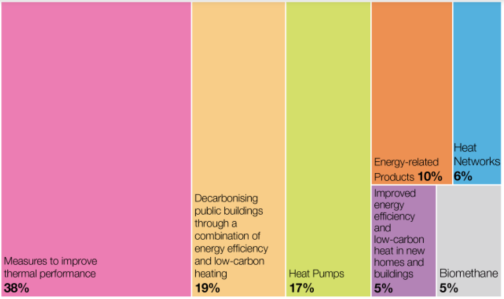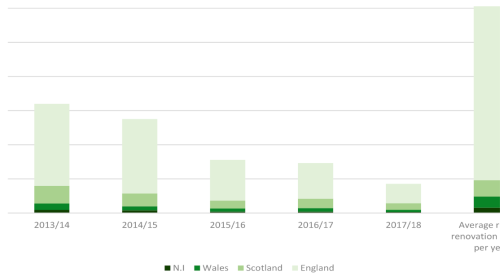How is the UK Government planning to incentivise low carbon heating system installation through the Heat and Buildings Strategy?

The support, apportioned to the electrification of heat and increases in energy efficiency, aims to incentivise the uptake of low carbon technologies across sectors and tenancy types through the following:
- The Boiler Upgrade Scheme will launch in April 2022 and provide an upfront grant of £5000-£6000 to fund the installation of low carbon technologies in homes and some non-domestic properties in England and Wales. The £450 million scheme supports the installation of heat pumps and, in some cases, biomass boilers.
- The Home Upgrade Grant Scheme is available for improving the energy performance of homes owned, or rented, by low-income households. The £950 million additional support for the existing scheme aims at building envelope improvements of properties with Energy Performance Certificate (EPC) of D to G.
- The Social Housing Decarbonisation Fund allocates £800 million to upgrade a significant proportion of social housing stock to an EPC Band C rating. The funding will be available to social landlords, including housing associations.
- Heat Network Transformation Programme has a budget of £338 million to develop and scale up low-carbon heat networks and facilitate market growth.
- The Public Sector Decarbonisation Scheme provides grants for public bodies to replace end of life fossil fuel systems for delivery of heat with low carbon technology. The total of £1.425 billion aims to support low carbon ambitions in the public sector.
A chart published by Carbon Brief offers a breakdown of estimated potential emissions savings from the various strategies aiming at energy efficiency improvements:

The heat and buildings strategy signals a significant shift towards low carbon technologies and ensuring these are no more expensive than traditional gas boilers. However, does it go far enough to drive the scale of energy efficiency increases required to reach net zero carbon by 2050.
Is there enough support to improve insulation levels in our buildings?
In March 2021, the UK Government brought the Green Homes Grant to an early end. The £1.5 billion scheme was announced in September 2020 as a flagship component of the 'green recovery'. It was set up to support energy efficiency improvements for some 600,000 homes. At the time of closure, only 20% of the funding was spent, and approximately 47,500 homes benefitted.
The scheme's failure did not lie in a lack of consumer interest but rather an administrative process that was lengthy and frustrating for both applicants and installers. A large proportion of the funding, some £50 million, was spent on administrative procedures. There were also various practical difficulties, such as installer certification and payment periods.
Government figures show that approximately 16 million homes in England and Wales are in EPC Band C or below. The public interest in the original Green Homes Grant, gauged by the 557,417 genuine visits to the Simple Energy Advice webpage, was high. The Home Upgrade Fund and the Social Housing Decarbonisation Fund aim to achieve insulation levels to prime properties for installing heat pumps and other low carbon technology.
We should be mindful of the hurdles ahead as the number of homes improved through government supported energy efficiency measures is falling year on year and are considerably below the rate required to meet the 2035 EPC C target.

Potential savings of £7.5 billion annually are estimated if all UK homes were upgraded to EPC Band C. In contrast, the estimated cost of retrofitting the entire housing stock of Essex County Council to at least EPC band C is £6.8 billion, and Rotherham Metropolitan Borough Council estimates it would cost, on average, around £20,000 per property.
What are the plans to reduce the cost of electricity unveiled in the Heat and Buildings Strategy?
The Heat and Buildings Strategy aims to explore ways to rebalance or shift energy levies in such a way that is fair to low-income families that rely on gas and can't immediately switch to low carbon heat pump technology. The Heat and Buildings Strategy will 'look at options to expand carbon pricing and remove costs from electricity bills while ensuring that we continue to limit any impact on bills overall.
To get to this point, the Heat and Buildings Strategy announced the launch of a 'fairness and affordability call for evidence' to conclude with a decision in 2022. There is no doubt that the discussion on the fairness of carbon pricing will recommence once it is. This is a much-needed conversation, albeit made uncomfortable by the recent energy bill crisis and price cap increase announcements. Reducing electricity costs, at least in comparison to fossil fuels, could notably expedite the uptake of low carbon electric solutions.
How will the UK Government support the heat pump market and expedite the uptake of heat pumps?
The Heat and Buildings Strategy will introduce a £1 billion Net Zero Innovation Portfolio, acknowledging that innovation is the key to developing commercially viable low carbon technologies that can support the decarbonisation of heat in our buildings. The funding will be available across ten priority areas with the notable mention of energy storage and flexibility in homes and buildings.
The £60 million Heat Pump Ready Programme recognises that heat pumps are a key solution to decarbonising homes and buildings. The programme is split into three delivery streams:
- £30 million funding for solutions for high-density heat pump deployment
- Up to £25 million grant funding to develop tools and technology to overcome barriers to heat pump deployment
- Up to £5 million trial support and learning
The Flexibility Innovation Programme allocates £65 million to support smart energy applications that will significantly increase the electricity system flexibility.
However, the headline of the Heat and Buildings Strategy is its Boiler Upgrade Scheme. The grants of £5,000 when switching to an air-source heat pump, or £6,000 when switching to a ground-source heat pump, equal the installation of 30,000 additional heat pump units per year. This is the level of installations achieved annually already and achieving it would mean we are still just 10% of the way towards the previous commitment the UK Government made in their Ten Point Plan for Industrial Revolution, to install 600,000 units per year by 2028.
To further support the uptake of heat pump technologies, the government committed to working with the heat pump industry to ensure that the cost of heat pump installation is no more than that of a gas boiler installation by 2030. Another area that will need urgent attention is the installer skills gap and upskilling to facilitate the expected significant increase of low carbon technology installations. There are currently only 1,000 MCS qualified heat pump installers in the UK, compared to the 96,000 ‘Gas Safe’ gas installers.
The industry should consider innovative heat pump technologies such as hot water heat pumps and ambient networks to help overcome the uncertainty over the skills gap and low carbon technology capital cost. These technologies do not require specialist installers and the cost of installing many hot water heat pumps falls below that of modern gas boilers. Wider uptake could help bridge these gaps today and pave our way to low carbon buildings by offering sustainable solutions where traditional options aren’t suitable.
To discuss heat pumps and other technology that can help increase the energy efficiency and reduce the carbon footprint of your buildings, contact one of our HVAC specialists today.








